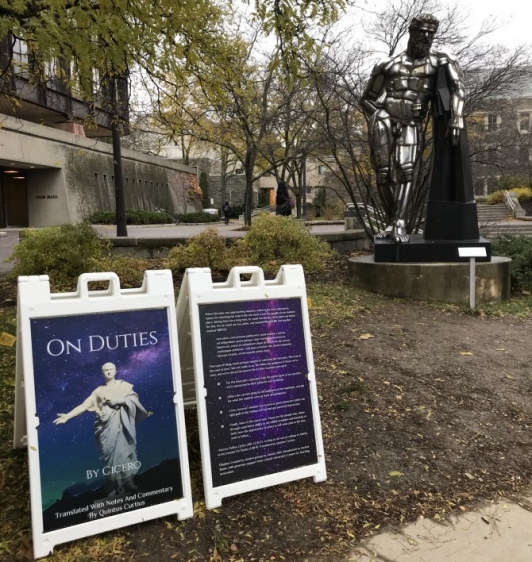Micro Grant in Action: Michael Fontaine

For his “Introduction to Ancient Rome” course, Michael Fontaine, professor of classics and associate vice provost for undergraduate education, wanted to bring a difficult topic into play—morality. He chose Cicero’s On Duties, which the Roman statesman, orator, lawyer, and philosopher wrote for his college-age son.
“His son was a bit of a screw-up,” Fontaine says. “So, Cicero decided to write a practical advice on moral decision-making, On Duties.” Fontaine wanted the book to prompt students to talk about right and wrong and what they had in common and what they didn’t.
Fontaine says the book is perfect for that—filled with ethical conundrums that spur discussion. One of those is the fable of Hercules: how as a young man, he was faced with choosing between two paths, one marked “Pleasure” and the other “Virtue.”
To engage his students, Fontaine set out to design an assignment where they would have to explore the contours of this dichotomy in groups. The assignment? To use the statue of Hercules outside Statler Hall to bring the hero’s pleasure-versus-virtue dilemma to life. “The assignment I gave them was that you have to illustrate both of these paths at the foot of the Hercules statue,” he says.
The assignment is one part of a larger effort on Fontaine’s part to use active learning strategies in his teaching. He uses iClickers, role playing, and skits, among other strategies, many of which he learned about from seminars offered by CTI. “I’m a convert,” he says. “The easy thing is to lecture, but it really is amazing to see how much more invested in the class people get with these strategies in place.”
Fontaine successfully applied for a micro grant from the Center for Teaching Innovation and was able to offer each group in his class a budget of $100, in addition to purchasing a sign to explain the project to the public. Five teams of eight students then worked together to come to a consensus on how to represent the two paths and how to pay for and execute it. After the installation, each student completed a reflection paper.
Despite some challenges posed by the weather (some of the projects were washed away in the rain and snow), the students took the assignment and ran with it, producing some surprising results in both content and how the teams bonded—a welcome outcome to Fontaine.
“A few years ago, there was a column in The New York Times about the loneliness of undergraduates,” Fontaine says. “I was talking to a colleague about this, and they said we ought to turn our classrooms into places where students can make friends. Whatever dynamics were in the groups, that was a success.”
With a few adjustments, Fontaine plans to teach “Introduction to Ancient Rome” with these strategies again next year, with a similar “virtue” versus “pleasure” assignment.
